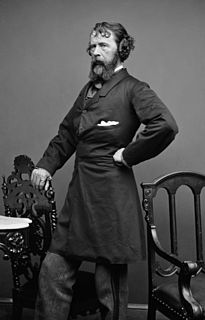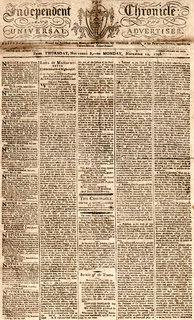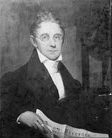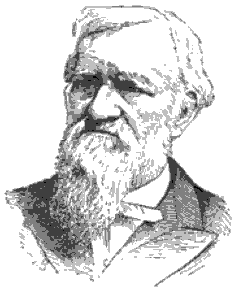Related Research Articles

Town & Country, formerly the Home Journal and The National Press, is a monthly American lifestyle magazine. It is the oldest continually published general interest magazine in the United States.

James Thomas Fields was an American publisher, editor, and poet. His business, Ticknor and Fields, was a notable publishing house in 19th century Boston.

Nathaniel Parker Willis, also known as N. P. Willis, was an American author, poet and editor who worked with several notable American writers including Edgar Allan Poe and Henry Wadsworth Longfellow. He became the highest-paid magazine writer of his day. His brother was the composer Richard Storrs Willis and his sister Sara wrote under the name Fanny Fern. Harriet Jacobs wrote her autobiography while being employed as his children's nurse.

Samuel Griswold Goodrich, better known under his pseudonym Peter Parley, was an American author.

Richard Storrs Willis was an American composer, mainly of hymn music. His best known melody is probably the one called, simply, Carol. This is the standard tune, in the United States, though not in Great Britain, of the much-loved hymn "It Came Upon the Midnight Clear" (1850), with lyrics by Edmund Sears. He was also a music critic and journal editor.

Emily Chubbuck was an American poet.

Calvin Ellis Stowe was an American Biblical scholar who helped spread public education in the United States. Over his career, he was a professor of languages and Biblical and sacred literature at Andover Theological Seminary, Dartmouth College, Lane Theological Seminary, and Bowdoin College. He was the husband and literary agent of Harriet Beecher Stowe, author of the best-seller Uncle Tom's Cabin.

George Pope Morris was an American editor, poet, and songwriter.

The Cambridge Chronicle is a weekly newspaper that serves Cambridge, Massachusetts. The newspaper was founded by Andrew Reid in May 1846 and is the oldest weekly newspaper in the United States. Owned by Gannett, it serves 18% of Cambridge's households.

The Independent Chronicle (1776–1840) was a newspaper in Boston, Massachusetts. It originated in 1768 as The Essex Gazette (v.1–7) in Salem, and The New-England Chronicle (v.7–9) in Cambridge, before settling in 1776 in Boston as The Independent Chronicle. Publishers included Edward E. Powars, Nathaniel Willis, and Adams & Rhoades; Capt. Thomas Adams (ca.1757–1799) was the editor prior to his death in 1799. For some time it operated from offices on Court Street formerly occupied by James Franklin. As of the 1820s, "the Chronicle [was] the oldest newspaper ... published in Boston; and has long been considered one of the principal republican papers in the state; and its influence has, at all times, been in exact proportion to the popularity of the cause which it has so warmly espoused." After 1840 the paper continued as the Boston Semi-weekly Advertiser published by Nathan Hale.

The American Herald (1784-1790) was a newspaper in Boston and Worcester, Massachusetts, published by Edward Eveleth Powars and Nathaniel Willis.

Nathaniel Willis (1780–1870) was an editor and publisher in Boston, Massachusetts, USA, in the 19th century. He established the Eastern Argus and the Boston Recorder newspapers, and The Youth's Companion magazine.

Nathaniel Willis (1755-1831) was a publisher and editor in the late 18th century. He participated in the Boston Tea Party in 1773. He issued the Independent Chronicle (1776-1784) and the American Herald in Boston, Massachusetts, and worked for some years with Edward Eveleth Powars as "Powars & Willis."
Edward Eveleth Powars was a printer in Boston and Worcester, Massachusetts, in the late 18th century. He published the Independent Chronicle (1776-ca.1779), the Boston Evening-Post (1781–1784), the American Herald (1784–1790), and The Argus. He worked with Nathaniel Willis as "Powars & Willis."

The Constitutional Telegraphe (1799-1802) was a newspaper produced in Boston, Massachusetts, at the turn of the 19th century. The paper sympathized with the Democratic-Republican Party, and supported Thomas Jefferson. Publishers included Samuel S. Parker, Jonathan S. Copp, John S. Lillie, and John Mosely Dunham. The paper was originally called the Constitutional Telegraph. The "e" was added to Telegraphe with the 1 January 1800 issue. This issue included a new engraved masthead of an eagle and the motto "We advocate the rights of man."

Oliver Dyer was an American journalist, author, teacher, lawyer and stenographer. A pioneer in phonography, he developed his own shorthand system which was the first to be adopted for use in the United States. It was used not only for courtroom testimony but also for recording political events such as the Free Soil Convention in Buffalo, New York, and sessions of the 30th United States Congress in Washington, D.C., in 1848. It was in the latter role that he became the first Congressional shorthand reporter.
The Boston Miscellany of Literature and Fashion was a monthly literary and fashion magazine published in Boston, Massachusetts from 1842 to 1843. It also published book reviews and music.

The Salem Observer (1823-1919) was a weekly newspaper published in Salem, Massachusetts. Among the editors: J.D.H. Gauss, Benj. Lynde Oliver, Gilbert L. Streeter, Joseph Gilbert Waters. Contributors included Wilson Flagg, Stephen B. Ives Jr., Edwin Jocelyn, E.M. Stone, Solomon S. Whipple. Publishers included Francis A. Fielden, Stephen B. Ives, William Ives, George W. Pease, Horace S. Traill. In the 1880s Elmira S. Cleaveland and Hattie E. Dennis worked as compositors. Its office was located in "'Messrs P. & A. Chase's ... brick building in Washington Street'" (1826-1832) and the Stearns Building (1832-1882). "In 1882 the proprietors erected the Observer Building, of three stories, of brick, in Kinsman Place next to the City Hall." As of the 1870s, one critic noted that although "the Observer is supposed to be neutral in politics, ... it has always shown unmistakable signs of a strong republican tendency."
The Eastern Argus was a newspaper published in Portland, Maine, United States from 1803 to January 1921. In early 1921, it was succeeded by the Portland Press Herald.
References
- 1 2 3 "Boston Recorder and Telegraph (Boston, Mass.) 1826-1827". Library of Congress. Retrieved 2021-06-07.
- 1 2 "Boston Recorder (Boston, Massachusetts) 1817-1824". Library of Congress. Retrieved 2021-06-07.